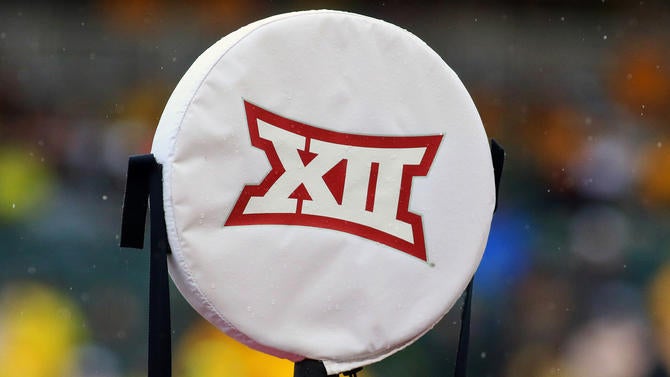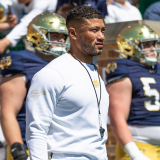Members of the Big 12 board have unanimously agreed to reinstate a championship game for football, beginning in 2017.
After realignment in 2010 saw Nebraska and Colorado leave, the conference had only 10 teams and was forced to stop playing a championship game due to NCAA rules. A new rule was passed by the NCAA in April 2015 that deregulated the conference title games and allowed any conference, no matter the number of members, to host a championship game if so decided by the league.
The Big 12 is the first conference to take advantage of the deregulation rule, and commissioner Bob Bowlsby told reporters on Friday that the conference would "in all likelihood" split into two five-team divisions in 2017 with round-robin scheduling still an option.
#Big12 spring meetings: Commissioner Bowlsby on format and structure of #Big12FB Championship game. https://t.co/W3vwj3ps3g
— Big 12 Conference (@Big12Conference) June 3, 2016
"With two five-team divisions, you can still continue to play a full round robin," said Bowlsby. "There was a lot of conversation about late season rematches. Last year, the Oklahoma-Oklahoma State game was a good example. It would've been played one week and then played another week, so obviously that's not optimal, but we'll look at our current model and the selection process that goes with it and we'll look at other models, too."
The catalyst for bringing back the championship game model was the impact of the College Football Playoff and the way the Big 12 felt unfairly left out in 2014 when Baylor and TCU were on the outside looking in on the four-team playoff. Oklahoma president David Boren noted that, based on the information they've received from projections and models, the championship game was something they felt would help their chances of getting into the playoff -- and also make them a lot more money.
#Big12 spring meetings: OU's David Boren on unanimity and next steps for #Big12FB Championship game. https://t.co/43W9y0BdK1
— Big 12 Conference (@Big12Conference) June 3, 2016
"The presentations by our consultants on the value of the championship game both in terms of providing a 13th data point to help us have a better chance of getting into football playoffs, for example, and other competitions was very, very convincing," said Boren. "Let's just say that, reputationally, having that 13th data point is very helpful in terms of our competitive position, also very helpful in terms of our financial position and increasing our revenue distribution per school."
Bowlsby also noted that potential expansion was still a topic of discussion within the conference, but the return of the championship game will occur whether the league has 10 teams or adds 2-4 more.
Oklahoma leads current members of the conference with seven Big 12 Championship Game wins, followed by Texas (3) and Kansas State (1).
The game was last contested in what is now known as AT&T Stadium in Arlington, Texas, in back-to-back seasons from 2009-10. It is fair to believe that Jerry World will likely be the favorite to serve as the host site in the future, but Bowlsby said no venue has been chosen as of yet and there will be a bidding process.
The television rights to the Big 12 Championship Game will be split by Fox and ESPN; Fox will broadcast the game in odd years and ESPN broadcasting the game in even years, according to CBS Sports' Dennis Dodd.
By bringing the championship game back, the conference expects to bring in $27-28 million more in revenue on an annual basis, per Dodd. This comes on the heels of a year when the conference saw 20 percent growth in revenue to $304 million, which was distributed evenly among the 10 programs and puts the Big 12 third nationally behind the SEC and Big Ten.

![[object Object] Logo](https://sportshub.cbsistatic.com/i/2020/04/22/e9ceb731-8b3f-4c60-98fe-090ab66a2997/screen-shot-2020-04-22-at-11-04-56-am.png)
















